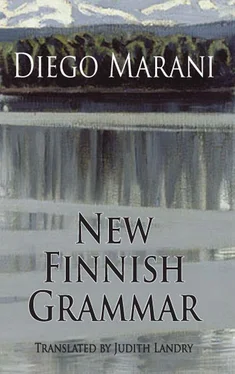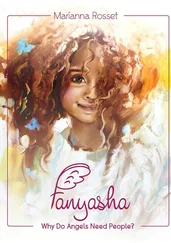‘Look how solidly it’s built. Their truth is as heavy as stone, as conspicuous as those gilded domes, massive and down-to-earth. They named this church after the dormition of the Virgin. That’s a myth of their own making, to spare the mother of God the brutal shock of physical death: it makes death into one endless sleep. A noble ruse, it’s true. But if death is sleep, the world to come is just a dream, a fleeting vision.’
I did not know what katoavainen meant but, since he pronounced it next to näky , or vision, I could hazard a guess. I repeated the two words to myself to bind them to one another in my memory. We went into the church. The walls were crowded with images, the floor was elaborately worked and the altars were laden with gilded candlesticks, so that the cold light falling from above seemed to have a warmer glow, to be less harsh. We were surrounded by a circle of saints who looked down on us benevolently. Beneath each holy image, candles shone, their stems as slender as those of flowers. The steps leading to the niches were covered with red carpets. Elaborate brass lamps hung from the marble columns. We took a few steps in silence. Walking ahead of me, the pastor pointed to one picture, then another, then to the domes, with their coloured mosaics with scenes from the Old Testament. When we came out, the dull light hurt my eyes. The ethereal city stretched out below us, aloof and uncaring. We went down again towards the market square.
‘You see, in the Orthodox World you are never alone. You end up by believing that when you go into the next world, you will be received into that crowd of welcoming saints and angels who are gathered there especially to meet you. They will keep you company until the Last Judgement, which, for the Orthodox, is nothing to be afraid of. It’s just a rite of passage, a bit like the day when soldiers take the oath, nothing more. Then a new life will begin, exactly like this earthly one but without suffering, in a glittering many-splendoured earthly paradise. For the Orthodox, death does not exist and paradise is just like this world, with some slight alterations for the better.’
From the seashore we turned to look at the Uspenski Cathedral once more before turning down the Esplanadi. With some difficulty, one by one, I was taking in Koskela’s words. In the pauses between them, I heard them die away. I watched them floating down into the landscape of the city around us, so as to note where they fell, so that I could go and collect them later: a belltower would remind me of a verb, I wasted a whole ship on an adjective and entrusted the all-important subject to a tram. The pastor’s thought was scattered throughout Helsinki, and I could reread it every time I pleased.
‘For us, however, there is no redemption. We grow up with a need for expiation and continue to punish ourselves throughout our lives. We entertain no hopes, make no demands. We are gobbets of pure evil, and the best thing we can do is to melt away, wither away, without any fuss. Only in the world to come will some of us be vouchsafed a way out. Nor do our actions serve to earn us any reward, for our fate is predestined. Our damnation or salvation is already sealed, right from the day of our birth. But only after death will we know this. That is why our lives are just one stricken period of waiting.’
Lunastus , redemption, is a lovely word. I liked to repeat it to myself, to feel its mysterious murmur on my breath, as though some spirit were unleashed by those lisping sounds and set soaring upwards towards higher worlds. We had now crossed the Mannerheimintie; after walking in front of the Hotel Torni, we turned into the Lönrotinkatu. We went into a park, full of well-grown, shady trees, in the middle of which we could just make out a white building with a greenish roof. Here the pastor suddenly came to a standstill.
‘That, on the other hand, is our soul. Look at these memorial tablets. They’re all over the park.’
I looked around and noticed marble slabs set into the thick grass. Some crooked, others half sunk into the earth, they were thinly and discreetly scattered throughout the great stretch of grassy land.
‘They’re tombs; this is a cemetery. But it’s also a park, where living people go to walk among the dead, This is our idea of the world to come: a place half a metre below ground, not a cheerful throng of saints. Nothing celestial or sublime about our world to come: it’s a gloomy, colourless limbo where absence of guilt does duty for beatitude. Guilt is the wellhead of all that gives us life. We do not know what it is we feel guilty about, we have forgotten, it’s not important any more. Perhaps it is just the guilt we feel at having come into the world at all. Eternal peace is liberation from guilt. Or, if you like, from life.’
A gust of wind swept through the trees, then ran along the grass. The weather was changing: a storm was brewing up. Above the sea the sky was still white and still, but black clouds were rolling in from the west, and the park suddenly became dark. Beneath the trees the light began to fade, and the first raindrops pattered onto leaves which had now taken on silvery tones, like those of olive-trees.
‘Come on, let’s go into the church, at least we’ll be in the dry,’ said the pastor, pointing towards the white building we’d seen earlier. We ran towards the doorway and went into what turned out to be a Lutheran Church. It was built entirely of wood, a single space without nave or aisles. Once inside, Koskela stopped under the organ loft and pointed out a notice hanging on the wall. It had a red and black border, and looked somehow ominous. I tried to read it, but there were many words I did not know. I understood only bits of any one sentence, but nonetheless I gleaned an idea of the general meaning. It talked of mothers, suffering and the homeland. Even the title bristled with dishearteningly long words, studded with umlauts. But, taken letter by letter, the screws that held them so tightly in place began to yield, allowing some drop of meaning to seep out.
‘This is a proclamation by Marshal Mannerheim, father of Finland, the man who led us out of Russia as Moses led the Israelites out of Egypt. It says that he is awarding every Finnish mother the Cross of Freedom, as compensation for the pain of having lost their sons in war. What a baffling title — Ylipäällikön päiväkäsky . Order of the day from the Commander-in-chief. But for those who can read between the lines, it’s actually a war bulletin; and nowhere else in the world would you find a war bulletin posted up in a church. This proclamation was issued two years ago, on 10 May 1942, when the Finnish authorities had agreed to let the German troops go through their country on their way to launch a new attack on Leningrad. This was the beginning of our revenge; or of our ultimate defeat. At the end of hostilities with the Russians in 1940, we had had to accept extremely harsh conditions of surrender. Without having lost a single battle, with her army still intact, Finland was forced to hand over those very battlefields where her little fighting force had managed to stand up to the mighty military power of Soviet Russia. We had no choice. To have refused would have meant total annihilation. So Finnish provinces and cities had to be evacuated. There was a massive exodus from Karelia. Viipuri, Finland’s second city, was emptied of its inhabitants and handed over to Russia. We have taken it back; but how long will we be able to hold on to it? We have always played for high stakes with the Russians, always bet heavily with nothing to fall back on. And, so far, this has paid off. At the time of the Bolshevik Revolution, Finland too was caught up in the civil war. Red and white Finns were massacred and exterminated so viciously that our country lay all but empty for decades. Even today we do not talk about those years, we do not mourn those who died, and many graves remain unmarked. Even today the military authorities are afraid that some of the soldiers who go off to defend our frontiers might be covert Reds, who would fraternize with the Soviets! We have taken a great gamble, we have risked our all! The victory of the Whites meant the survival of our nation, of our way of life, our God. If the Reds had won the civil war, if we had refused peace in 1940, today this place would be an army depot or a communist party headquarters. And the memorial tablets you saw out there would have ended up serving as paving for some city street. In reality, this ‘proclamation’ is an appeal, launched by Mannerheim to invite our people once again to risk their lives in the eternal struggle against the Russians. Accepting Hitler’s help meant incurring Russia’s fury and risking annihilation. Awarding the Cross of Freedom to Finland’s mothers meant asking them to make the supreme sacrifice, giving their country even those sons who had survived, who had come unscathed through the Winter War. Their country was calling upon them once again. Marshal Mannerheim is the Väinämöinen of our time. He made Finland a free country, he saved us twice over: from the Reds and from the Russians. For us, these words come second only to the Bible. Do you see the difference? The Orthodox bow down before gilded images, we bow down before a typewritten order of the day! Now do you understand why we are two separate races?’
Читать дальше












